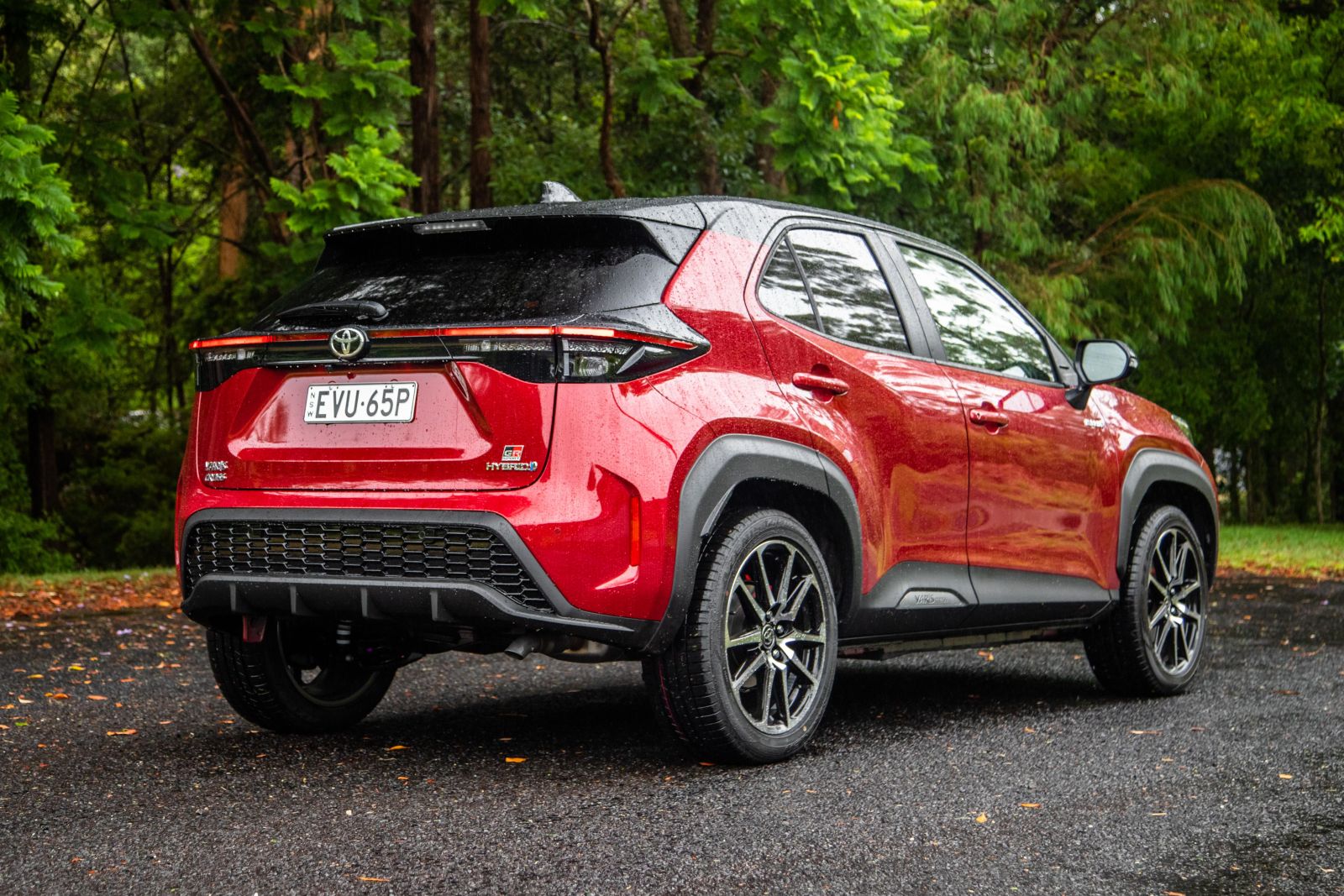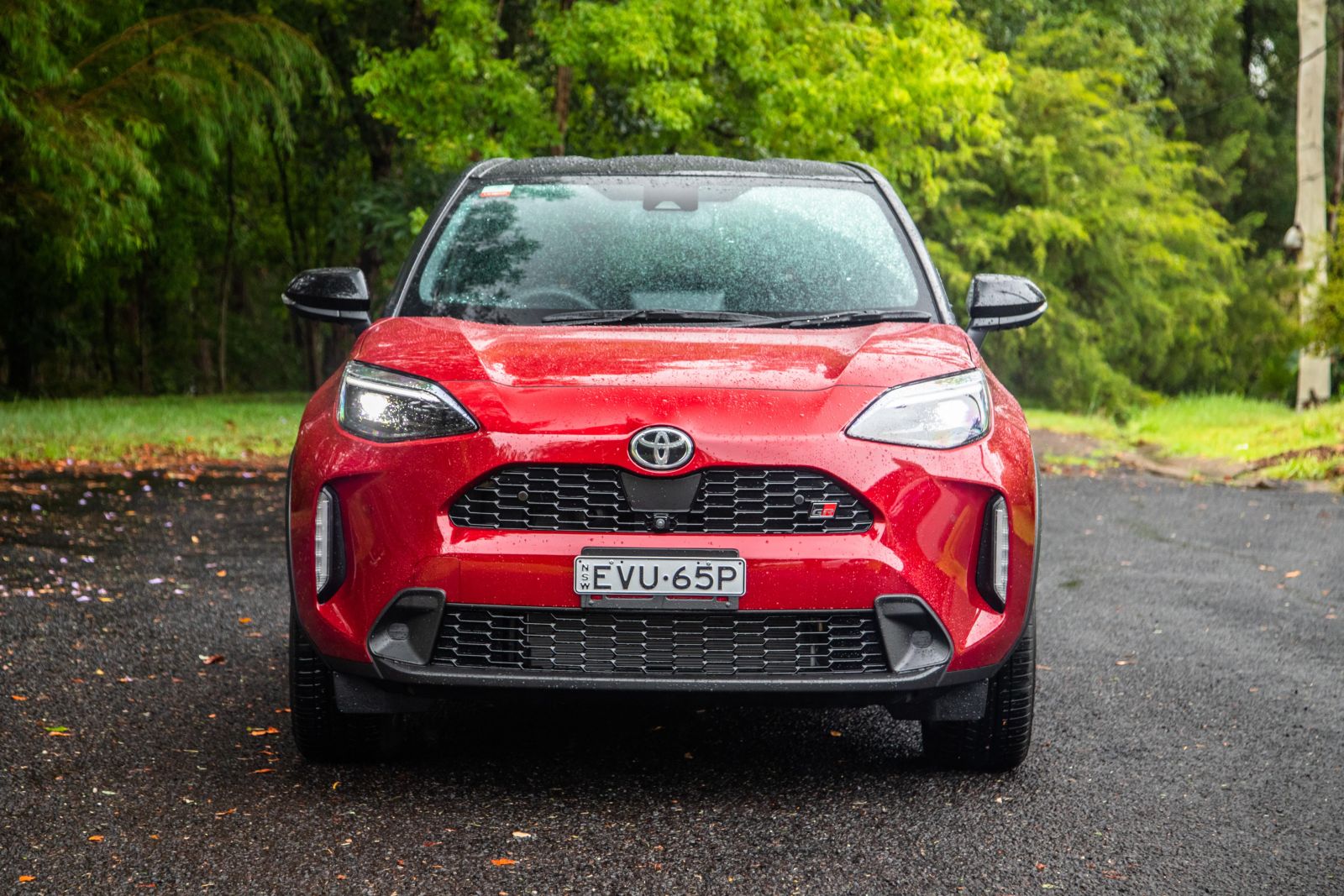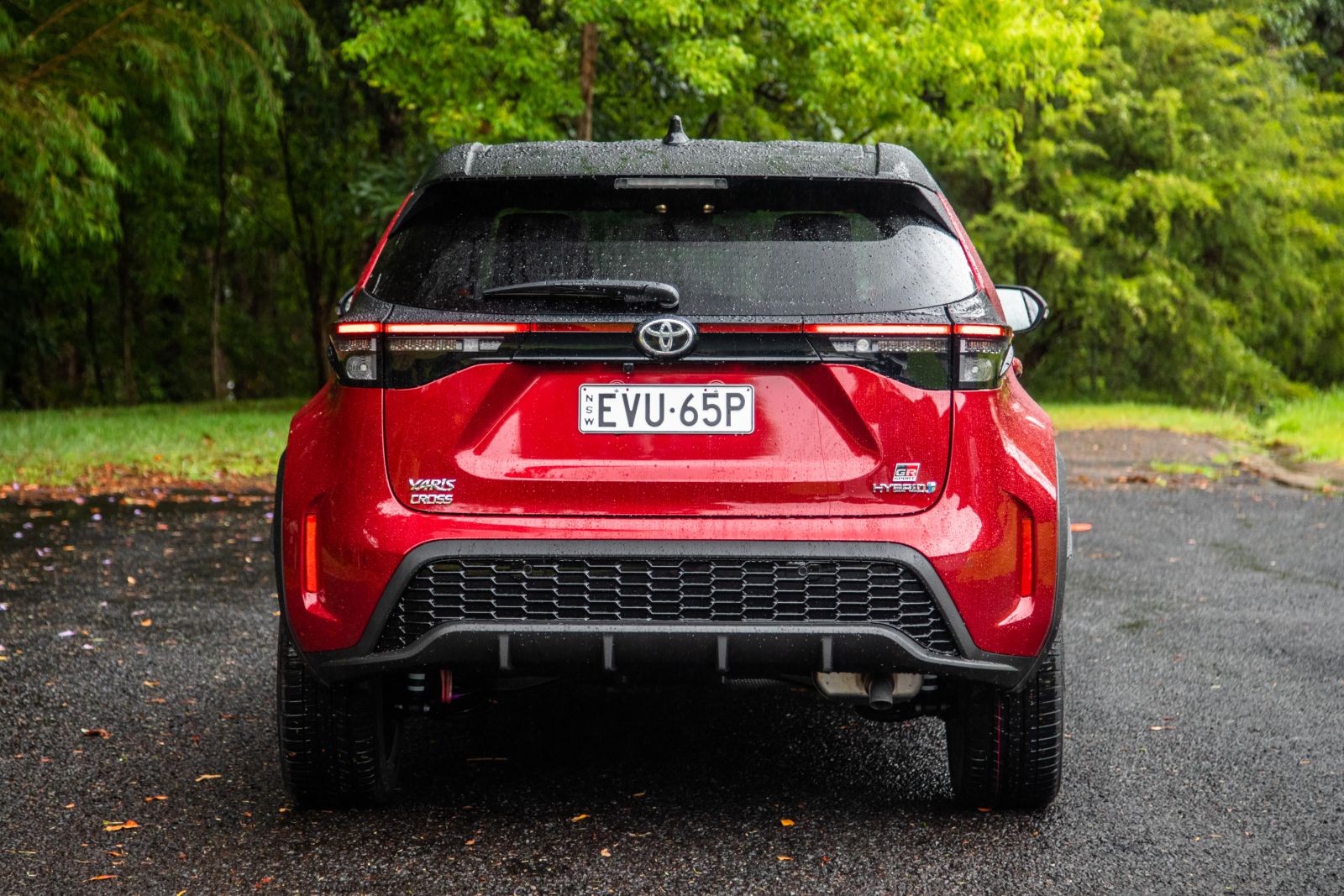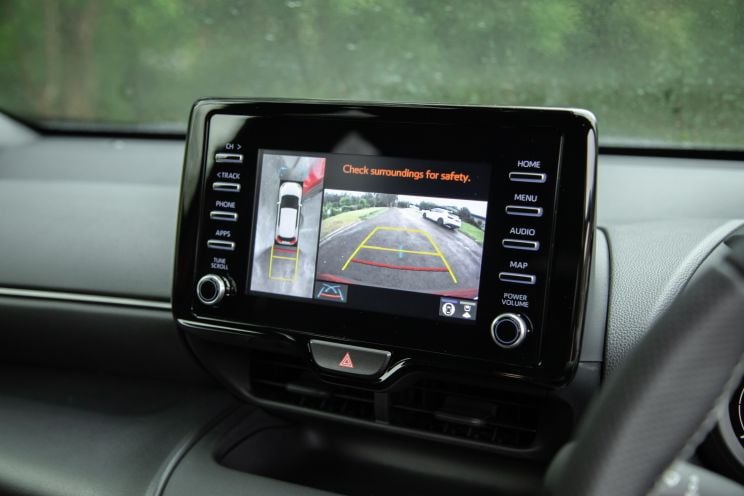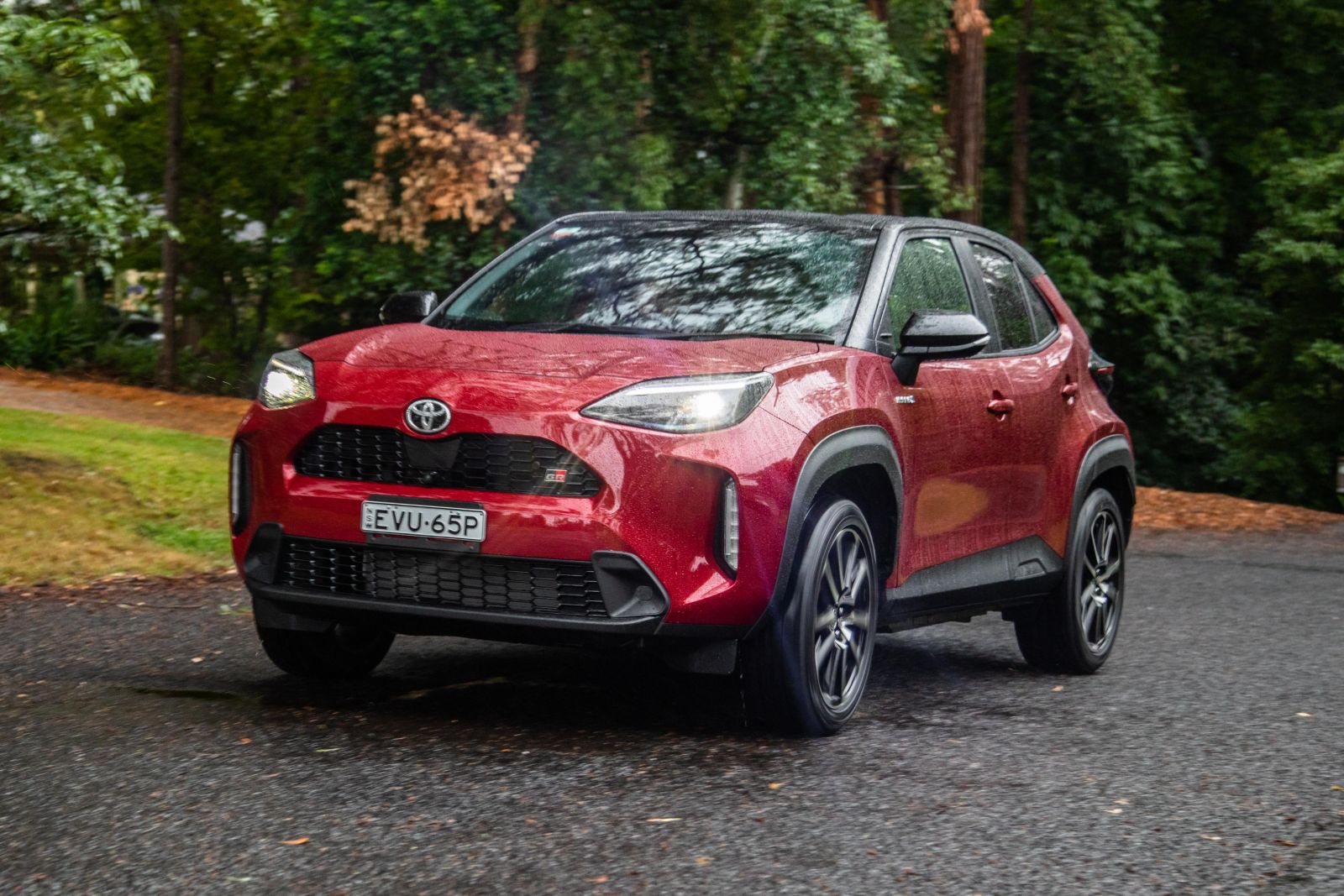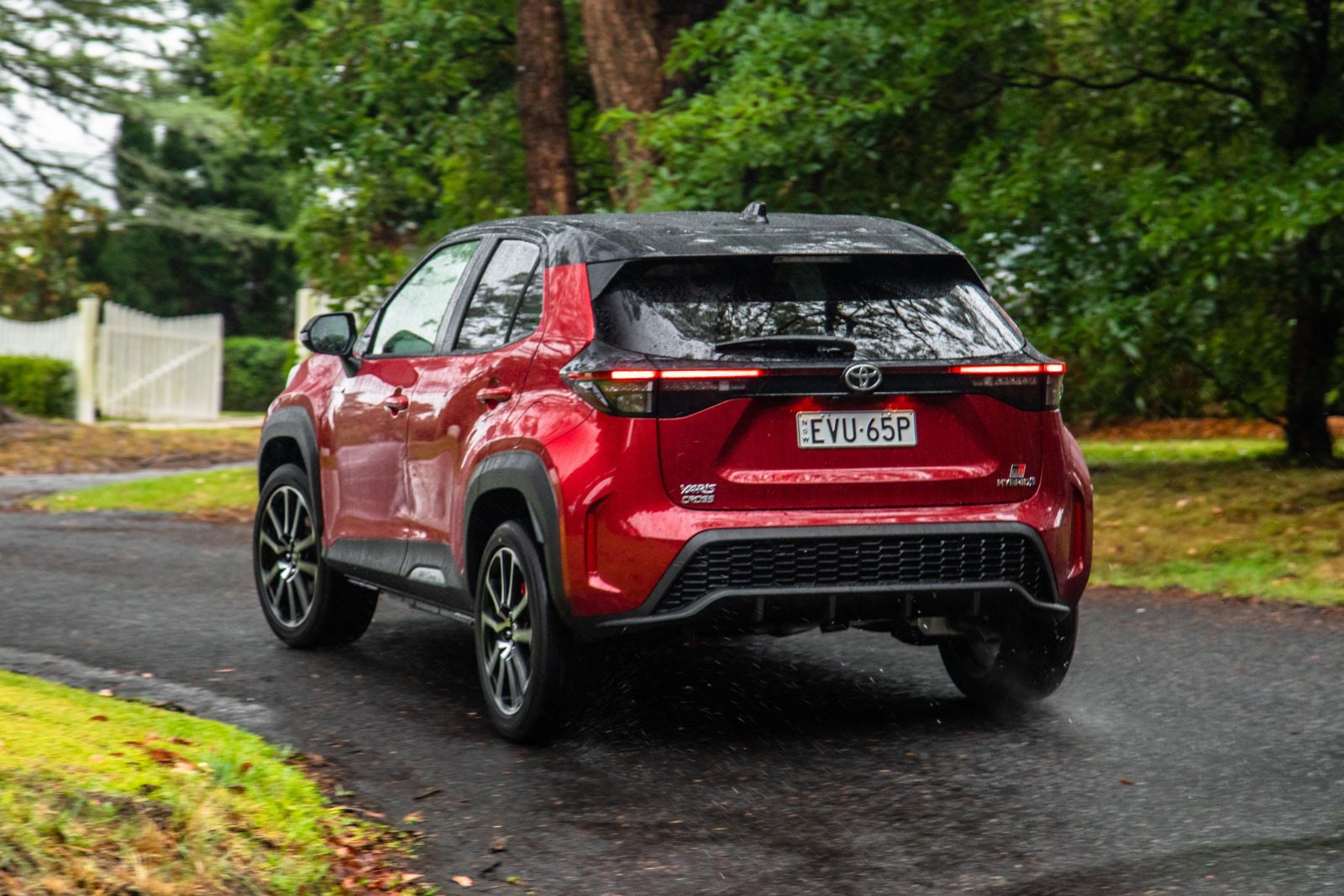When I wrote up my list of new Toyota GR Sport model predictions, I sure as hell didn’t have the Yaris Cross scoring the treatment before, say, the Corolla hatch, or the HiLux ute.
In fact, when Toyota announced it was adding a Yaris Cross GR Sport Hybrid to its range, I almost spat my coffee across the room.
It seemed so incongruous to me – this is an urban SUV that is not sporty. It wasn’t supposed to be sporty. It wasn’t trying to be sporty. And, I thought, it didn’t need a sporty version to enhance its appeal.
But then again, I didn’t see the GR Yaris hot hatch being as good as it was, nor as in demand as it has been. And, while surely it’s important to stipulate that GR Sport is a distinctly different offer to a full-fat GR product, maybe there is more to this oh-so-Japanese ‘Gazoo Racing’ brand than meets the eye.
So here we are, with the GR Sport version of the Yaris Cross, which scores retuned suspension, exterior badging, new interior trim bits and a mid-range price point. All the details are below.
For the record, I didn’t actually write a list of GR Sport model predictions – I’m not that big of a loser.
How much does the Toyota Yaris Cross GR Sport 2WD Hybrid cost?
The Yaris Cross range was already broad, and the addition of the GR Sport 2WD Hybrid model could actually seem a bit confusing.
It doesn’t really have a spot to fit comfortably, though Toyota managed to squeeze it in just above the Urban 2WD Hybrid grade.
2023 Toyota Yaris Cross pricing:
Yaris Cross GX
- 2WD Petrol: $26,990
- 2WD Hybrid: $28,990
- AWD Hybrid: $31,990
Yaris Cross GXL
- 2WD Petrol: $29,990
- 2WD Hybrid: $31,990
- AWD Hybrid: $34,990
Yaris Cross GR Sport
- 2WD Hybrid: $35,840 (NEW)
Yaris Cross Urban
- 2WD Petrol: $32,990
- 2WD Hybrid: $34,990
- AWD Hybrid: $37,990
Prices exclude on-road costs
Does it have any competitors? Not really, unless you look at its in-house rival, the C-HR GR Sport Hybrid ($37,665), which is technically the next size up, being classed as a small SUV rather than a light SUV like the Yaris Cross.
Not hybrid, but like-minded sporty-ish compact crossover competitors include the Ford Puma ST-Line and ST-Line V, Kia Stonic GT-Line and Renault Captur R.S. Line.
What is the Toyota Yaris Cross GR Sport 2WD Hybrid like on the inside?
There are some nice bits, such as the GR-embossed front seats with fake suede and fake leather. They’re comfy and supportive, and the fact the trim continues in lashings across the back seat is nice, too.
There is a ‘sports’ steering wheel with leather bits, which also scores GR badging, though the controls can be a little difficult to get used to.
The cabin doesn’t feel otherwise sporty. In fact, it otherwise feels a bit drab.
The 7.0-inch touchscreen media system is adequate; and I like that it has very grabbable dials and buttons, as does the climate control system below.
But the screen display size is small by current standards, and while I appreciate the notion of a surround-view camera, the pixelated view you get is pretty lacklustre. For what it’s worth, the Chinese brands have largely nailed the camera quality conundrum.
At least the screen has satellite navigation, AM/FM and DAB radio, Apple CarPlay and Android Auto (wired) and there’s a second USB port (1x USB-C, 1x USB-A) in the dashboard – which other versions miss out on.
Opinions are divided on the digital instrument cluster layout, which includes two small digital dials, and a middle, 4.2 inch display.
Part of me thinks that it’s a novel approach to the design, but another part of me thinks it looks old already – especially when so many brands are moving towards digital instrument panels as standard, even in cheap models. At least it’s very easy to see everything at a glance.
There are a lot of open storage caddies which, if you know a bit about the development process of cars, is a clear indication of cost savings – because lids and the mechanisms they require, well, money.
That might be okay for you if you’re in the “lids just get in the way and waste my time anyway!” crowd, but when it comes at the expense of a centre console and armrest and means there’s only the glovebox or the boot for “out of sight” storage, then it’s a bit annoying.
There are plenty of storage bins though – a couple between the front seats, large door cubbies, and a receptacle on the dashtop near the screen.
In the back there are bottle holders in the doors, a map pocket, and access to a cup holder at the back of the section between the front seats.
Plus, if you lower the middle section of the back seat (it’s a 40:20:40 arrangement) then you have access to a pair of cup holders, or you could use it as a ski port if you make sure you secure whatever is holstered there.
Passenger space is good for a car in this class. I could sit behind my own driving position (I’m 182cm) and there was enough foot, knee and headroom for me to be comfy. Three adults my size across the back won’t be a goer, and nor would three child seats.
Not that you’d want to try and hitch three kid seats in the back, let alone get three kids in the car. As is a typical issue with the current generation of Toyota models, the rear doors don’t open very wide, so loading anything that isn’t yourself into the back seat can be a bit of a task.
Rest assured there are ISOFIX points in the window seats, and a trio of top-tether hooks as well.
Just note, though, that there are no rear directional air vents, and there’s no USB charging present in the back, either. The window line also takes upwards quite sharply, and the dark headlining does make it feel even more claustrophobic – some kids won’t like it here.
The boot is pretty clever, too. It has a dual-floor setup that means you can have a flat load-in lip (and flat load-through over the back seats when folded) but less storage, or a bigger cavity that you have to drop stuff into over the back ledge.
The boot capacity in max mode to the “parcel shelf” is 390 litres. The inverted commas there are because the shelf would be as useful as putting anvil in a bowl of jelly.
There’s also a space-saver spare wheel in the boot, under the second layer floor.
What’s under the bonnet?
The Yaris Cross GR Sport comes with the hybrid powertrain. You can’t get it as a petrol-only model.
That means it runs a 1.5-litre three-cylinder petrol engine teamed up to a pair of front motor generators and a battery pack, all of which work together for a combined 85kW of power, according to Toyota. There is no combined torque figure stated, but the engine is apparently rated to 120Nm.
So, there is no power bump for the GR Sport, and Yaris Cross Hybrid models use a CVT (continuously variable transmission) automatic.
This spec is front-wheel drive only – there are all-wheel-drive hybrid models available if that’s what you prefer, you just won’t get it with GR bits.
How does the Toyota Yaris Cross GR Sport 2WD Hybrid drive?
My partner often drives the cars I have to test, and I really value her “I’m not a motoring journalist” opinion.
And it’s fair to say, she didn’t think this car was sporty in any way, shape, or form. So… maybe those GR bits really are a waste of time.
She said she totally gets that it’s trying to be sporty, but that it might appeal more to those who find aqua aerobics, lawn bowls, or hardcore hiking on paved paths with your walking sticks to be sporty endeavours.
Suffice to say, she didn’t like it – and I didn’t think it justified being brandished with the GR badge, either.
The changes to the chassis might be significant: lowered (10mm) retuned suspension “that improves handling and sharpens the steering response and feel”, as well as a bound stopper being added to “control body roll and improve ride comfort”, not to mention additional bracing front and rear – but they might have been more effective if the brand had also upgraded the tyres.
The sporty 18-inch rims are shod with uninspiring Falken Azenis 215/50/18 rubber – tyres that aren’t going to be mentioned in the same breath as a Pilot Sport or P Zero. And frankly, when I gave this car a fang, I ran out of tyre talent before the chassis was ready to stop.
But it needs to be said: the steering might be a bit better than the standard Yaris Cross (you’d have to drive them back-to-back to really get a good judgement on that), and likewise the suspension might be a little lower and a little more eager to hunker down, but I was left underwhelmed by the “GR-ness”.
It also felt more uneasy at freeway speeds, with the body moving around a bit more than some drivers may appreciate.
And then there’s the powertrain; which is going to be fine if you just want a car to tool around town, to the shops and school, and not much else. Because a firecracker, it ain’t.
It makes a lot of noise, emits a lot of vibration and feels a lot like its out of puff when you ask much of this three-cylinder petrol-electric mix, but when you are doing what I suggested – easy going urban driving – you’ll note how eager it is to dip in and out of EV mode, and it will do that heaps.
But it’s the ugliness with which it has to call on the three-pot and CVT to lurch back into life under hard throttle and serenade those in the cabin with its incessant gurgling that really does make this car feel a bit, well, wrong.
A look at the tailgate badging symbolises the confusion of this car’s drive experience.
What do you get?
As mentioned, the Toyota Yaris Cross GR Sport 2WD Hybrid slides in just above the more primo-focused Urban 2WD Hybrid grade on price, but it actually builds its equipment list on the lower-spec GXL 2WD Hybrid.
Yaris Cross GR Sport highlights:
- 18-inch wheels in two-tone design
- Red brake calipers with GR logos (front)
- Unique front grille with black mesh
- Rear diffuser
- Black mirror caps
- GR badging
- Sport front seats
- Grey synthetic leather, perforated black suede upholstery
- Light grey stitching
- Aluminium pedals
- Gunmetal trim highlights
- GR logos on the headrests, steering wheel, and smart keys
- Additional USB-C port in the dash
- Nanoe2X air ioniser
That’s above the Yaris Cross GXL’s specification:
- LED headlights
- LED daytime running lights
- LED rear fog lamps
- 7.0-inch touchscreen infotainment system
- Wired Apple CarPlay, Android Auto
- Satellite navigation
- Surround-view camera
- 3-year subscription to Toyota Connected Services
- Digital instruments
- Keyless entry, push-button start
- Drive mode selector (Sport, Eco, Normal)
- 40:20:40 split-fold rear seats
- Space-saver spare wheel
Colour options include the no-cost Ink Mica black hue, while you’ll pay $575 for Lunar Blue metallic, Frosted White crystal pearl, Stunning Silver metallic, and Atomic Rush red.
Prefer the two-tone look like you see here? You can pay $1350 to have it in Atomic Rush with black metallic, or Frosted White with Ink Mica.
Is the Toyota Toyota Yaris Cross GR Sport 2WD Hybrid safe?
If you buy any other version of the Yaris Cross, it comes with a five-star ANCAP safety rating. For some reason, ANCAP specifically states that GR Sport doesn’t get the same top-notch safety score.
I asked ANCAP about this, and a spokesperson told me that Toyota hasn’t put forward the paperwork for it to be checked and assigned a rating – so, no five star score is likely for this version.
However, being based on the GXL grade, there is plenty of good stuff safety-wise in the GR Sport, including blind-spot monitoring, rear cross-traffic alert, and a surround view camera system – none of which appear in the base GX.
All versions score autonomous emergency braking (AEB) with pedestrian and cyclist detection, and there’s lane keeping assistance and adaptive cruise control with lane-centring tech, too.
The Yaris Cross is nifty in that it has a pair of front centre airbags to stop head-clashes in the event of a T-bone accident. There are also dual front, front side and full-length curtain airbags, for a total of eight.
How much does the Toyota Toyota Yaris Cross GR Sport 2WD Hybrid cost to run?
As with all Toyota models, the Yaris Cross is covered by a five-year, unlimited-kilometre warranty, which can extend out to seven years for the powertrain if you maintain logbook servicing.
Buy a hybrid version and have the car checked annually at a Toyota dealership, you’ll get up to 10 years of hybrid battery warranty included (with battery health checks done at every service).
Servicing is due every 12 months or 15,000km, whichever comes first, with the first five services capped at $250 each. Very affordable indeed.
But, you will need to add a hundred bucks a year or so to your budget if you want roadside assistance, which is not included for any Toyota model.
Talk about flying in the face of tradition. It used to be that if you bought the sporty version of a car, it used like 15-20 per cent more juice. Not any more.
The Yaris Cross GR Sport 2WD Hybrid has a stunningly low official combined cycle fuel consumption figure of just 3.8 litres per 100 kilometres.
I saw the trip computer dip well below that, hovering at 3.3L/100km over some 80km/h arterial road touring on my test loop. But overall, after a week of driving in summer heat (temp low, fan high on the A/C) I saw a return of 4.8L/100km.
For context, I also recently drove the upgraded 1.8L hybrid four-cylinder in the Corolla Hatch, which was showing 5.1L/100km driven in very similar conditions, and it is a considerably more refined powertrain in nearly every situation.
For further context, the AWD Yaris Cross hybrid models have official figures of 4.0L/100km, and the petrol front-wheel drive versions are comparative guzzlers, using 5.4L/100km.
The petrol models have a 42-litre fuel tank, while hybrid versions run a 36-litre tank. All can run on 91 RON regular unleaded petrol, too.
CarExpert’s Take on the Toyota Yaris Cross GR Sport 2WD Hybrid
Maybe I should be working in Toyota’s product planning team, because I really don’t think there should have been a GR Sport version of the Yaris Cross… at least, not with this powertrain and not with the tyres that have been fitted.
It is a pretty impressive compact SUV in a lot of ways that matter – it is well packaged, super efficient, cheap to own and run, safe, and pretty smart looking – but the expectations for someone who knows what GR is supposed to be about, and buys into the idea of it, might not be met.
They certainly weren’t met for me.
Click the images for the full gallery

